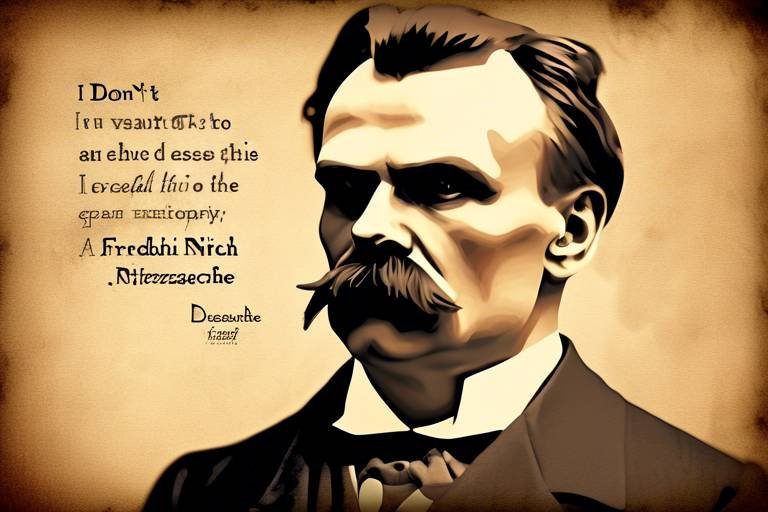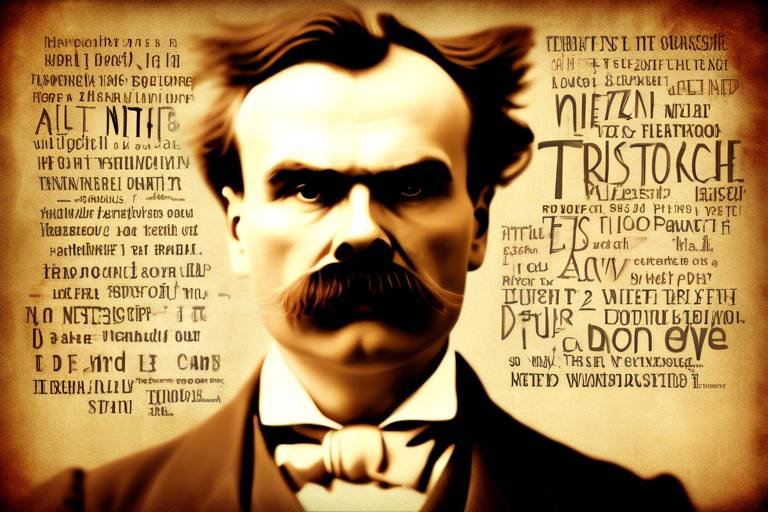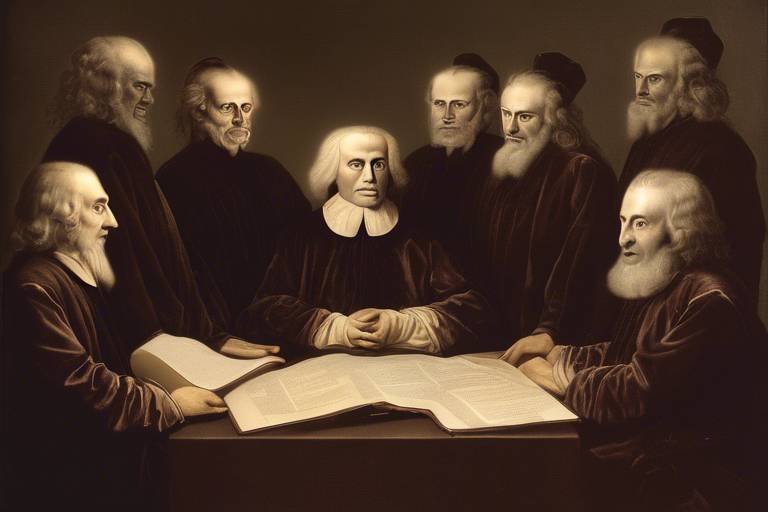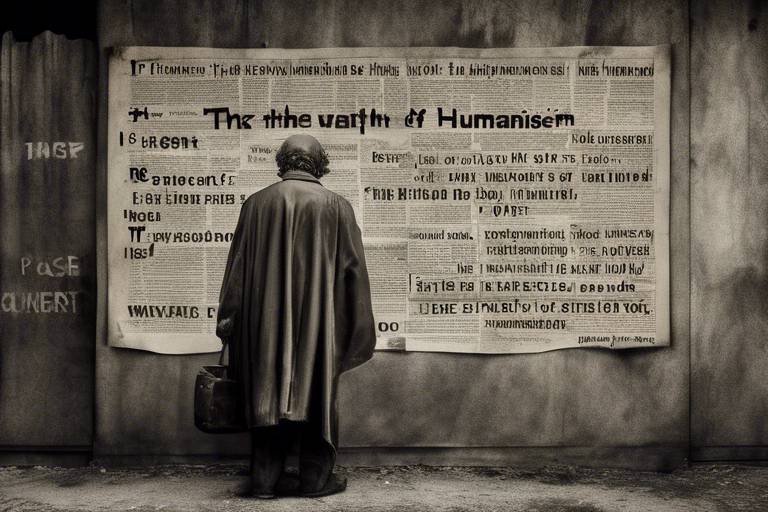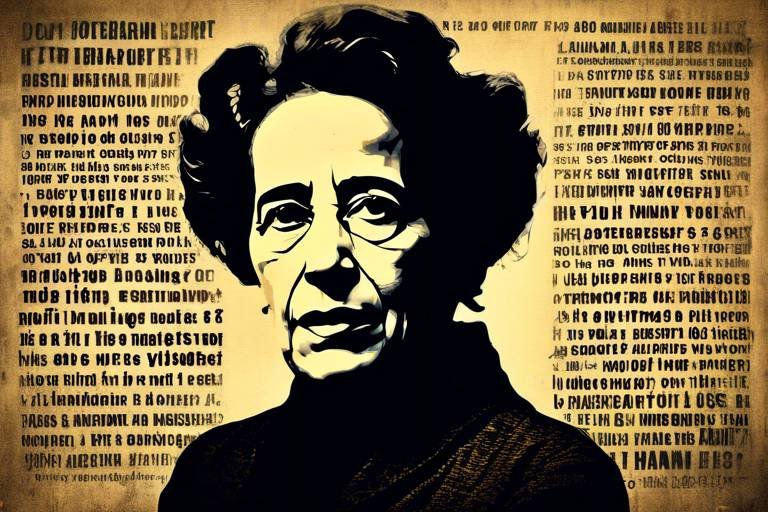What is Voltaire’s Concept of Enlightenment?
Voltaire, one of the most influential figures of the Enlightenment, had a unique interpretation of this transformative period in history. To him, Enlightenment was not just a philosophical movement; it was a revolution of the mind. It was about breaking free from the chains of ignorance and superstition that had long shackled humanity. Voltaire believed that through the power of reason and critical thinking, individuals could illuminate their paths and foster a more just and equitable society.
At its core, Voltaire’s concept of Enlightenment revolved around the idea that knowledge is power. He emphasized the importance of questioning traditional beliefs and established norms. In a world dominated by dogma and authoritarianism, Voltaire’s advocacy for rational thought and skepticism became a beacon of hope. He challenged the status quo, urging people to think for themselves and not merely accept what they were told. This quest for truth and understanding was central to his writings and philosophy.
Moreover, Voltaire’s Enlightenment was deeply intertwined with the notion of human rights. He believed that every individual deserved the right to express their thoughts freely and pursue their happiness. This belief laid the groundwork for modern democratic principles, emphasizing that a society thrives when its citizens are free to voice their opinions and challenge injustices. Voltaire famously stated, “I disapprove of what you say, but I will defend to the death your right to say it.” This quote encapsulates his commitment to freedom of expression, a cornerstone of Enlightenment thought.
In addition to advocating for rationality and freedom, Voltaire’s concept of Enlightenment also included a strong critique of organized religion. He believed that religion, when intertwined with politics and power, often led to oppression and conflict. Voltaire was a proponent of religious tolerance, arguing that individuals should be free to practice their beliefs without fear of persecution. His writings often highlighted the absurdities of religious fanaticism, urging society to embrace a more inclusive and humane approach to spirituality.
Ultimately, Voltaire’s ideas contributed to a larger movement that sought to reshape society. His emphasis on reason, tolerance, and freedom not only influenced his contemporaries but also laid the foundation for future generations. As we reflect on Voltaire’s legacy, it becomes clear that his vision of Enlightenment remains relevant today, reminding us of the enduring power of knowledge and the importance of questioning the world around us.
- What was Voltaire's main contribution to the Enlightenment? Voltaire's main contribution was his advocacy for reason, freedom of expression, and religious tolerance, which challenged the traditional norms of his time.
- How did Voltaire view organized religion? Voltaire was critical of organized religion, believing it often led to oppression and conflict. He advocated for religious tolerance and the separation of church and state.
- What is the significance of freedom of expression in Voltaire's philosophy? Freedom of expression was crucial in Voltaire's philosophy as he believed that open dialogue and the exchange of ideas were essential for a just and progressive society.

The Historical Context of Enlightenment
To truly appreciate Voltaire's contributions to the Enlightenment, it’s essential to understand the historical context in which he lived. The Enlightenment, often dubbed the Age of Reason, spanned the late 17th to the 18th century, a time characterized by a profound shift in thought, culture, and society. This era emerged from the shadows of the Middle Ages and was marked by a growing emphasis on reason, scientific inquiry, and individualism.
During the Enlightenment, Europe was witnessing significant transformations. The Scientific Revolution had laid the groundwork for questioning traditional beliefs, paving the way for thinkers like Voltaire to challenge the status quo. The rise of the bourgeoisie and the decline of feudalism contributed to a climate ripe for new ideas. Intellectual salons became the hotbeds of discussion, where ideas about human rights, governance, and social contracts were debated fervently.
Moreover, the political landscape was tumultuous. Monarchies faced challenges from burgeoning democratic ideals, and revolutions were brewing in various parts of the world. The American Revolution (1775-1783) and the French Revolution (1789-1799) were both influenced by Enlightenment thought, showcasing the desire for liberty and equality. Voltaire himself was a vocal critic of tyranny, advocating for the rights of individuals against oppressive regimes.
In this vibrant milieu, Voltaire’s ideas were not formed in isolation. He was influenced by a myriad of thinkers who preceded him, such as John Locke and Isaac Newton, whose works emphasized empiricism and rational thought. Voltaire synthesized these ideas, infusing them with his unique perspective and wit. His writings reflect the spirit of inquiry that defined the Enlightenment, as he sought to illuminate the darkness of ignorance and superstition.
The Enlightenment also coincided with significant advancements in literature and philosophy. The proliferation of the printing press allowed for the widespread dissemination of ideas, enabling works like Voltaire's to reach a broader audience. This era was also marked by a questioning of religious authority, with many Enlightenment thinkers advocating for a separation between church and state. Voltaire, in particular, was a fierce proponent of religious tolerance, arguing that dogma should not dictate the lives of individuals.
In summary, the historical context of the Enlightenment was a dynamic tapestry of social, political, and intellectual upheaval. Voltaire emerged as a key figure in this movement, using his sharp intellect and writing prowess to challenge established norms. Understanding this backdrop not only enhances our appreciation of his work but also highlights the enduring influence of Enlightenment ideals in our contemporary world.
- What was the Enlightenment? The Enlightenment was an intellectual and cultural movement in Europe during the late 17th to 18th centuries that emphasized reason, science, and individual rights.
- How did Voltaire contribute to the Enlightenment? Voltaire contributed through his writings that promoted reason, criticized organized religion, and advocated for civil liberties and freedom of expression.
- Why is the historical context important? Understanding the historical context helps us grasp the significance of Enlightenment ideas and their impact on modern philosophy and society.

Voltaire's Philosophy of Reason
Voltaire, one of the most prominent figures of the Enlightenment, was a staunch advocate for the use of reason as a guiding principle in human thought and action. He believed that rationality was not just a tool for understanding the world but a fundamental necessity for progress. In an age marked by superstition and dogma, Voltaire's emphasis on reason was revolutionary. He argued that individuals should not accept beliefs blindly; instead, they should question and analyze them critically. This approach not only challenged the status quo but also paved the way for a more informed society where knowledge was accessible to all.
At the heart of Voltaire's philosophy was the idea that reason could lead to truth and enlightenment. He famously stated, "Dare to think for yourself." This call to intellectual independence resonated deeply during his time, as many were shackled by the chains of tradition and authority. Voltaire's writings encouraged individuals to break free from these constraints and engage in rational discourse. He believed that through reasoned debate and discussion, society could arrive at better solutions to its problems.
Voltaire's skepticism was not limited to religion; he applied it to all areas of life. He questioned the validity of established norms and customs, arguing that many were based on outdated beliefs rather than rational thought. This critical stance is evident in his works, where he often employed satire to expose the absurdities of society. For instance, in his famous novella Candide, he critiques the overly optimistic philosophy of the time, demonstrating how blind faith in reason can lead to disastrous consequences.
Moreover, Voltaire's philosophy of reason was intertwined with his advocacy for freedom of thought. He believed that a society that stifles dissenting opinions is ultimately doomed to stagnation. By promoting an environment where ideas could be freely exchanged, he laid the groundwork for modern democratic principles. His famous quote, "I disapprove of what you say, but I will defend to the death your right to say it," encapsulates his unwavering commitment to free expression.
In summary, Voltaire's philosophy of reason was a clarion call to humanity. It urged individuals to embrace skepticism, challenge authority, and engage in critical thinking. By championing reason, Voltaire not only transformed the intellectual landscape of his time but also left a lasting legacy that continues to influence contemporary thought. His ideas serve as a reminder of the power of rationality and the importance of questioning the world around us.
- What did Voltaire mean by 'reason'? Voltaire viewed reason as the ability to think critically and independently, challenging established norms and beliefs.
- How did Voltaire's philosophy impact society? His emphasis on reason and free thought contributed to the development of democratic ideals and social reforms.
- What role did satire play in Voltaire's work? Satire was a tool for Voltaire to critique societal norms and expose the absurdities of blind faith and dogma.
- Why is Voltaire considered a key figure in the Enlightenment? Voltaire's advocacy for reason, tolerance, and freedom of expression made him a pivotal figure in shaping Enlightenment thought.

Critique of Religion
Voltaire's critique of religion is one of the most significant aspects of his Enlightenment philosophy. He was not just a critic; he was a revolutionary thinker who challenged the very foundations of organized religion. In his writings, he often questioned the dogmas and practices of the Church, advocating for a more rational and tolerant approach to spirituality. His famous phrase, "Écrasez l'infâme," which translates to "crush the infamous thing," reflects his disdain for the intolerance and superstition he believed were propagated by religious institutions.
Voltaire argued that organized religion often served as a means of oppression rather than a path to enlightenment. He believed that the Church wielded too much power over society, influencing laws and governance in ways that were detrimental to human progress. This critique was particularly relevant during a time when the Church held significant sway over the lives of individuals, dictating moral standards and societal norms. He posited that true morality comes from reason and not from religious edicts. In his eyes, faith should not be blind but rather informed by reason and experience.
One of the critical elements of Voltaire's critique was his advocacy for religious tolerance. He believed that individuals should have the freedom to practice their beliefs without fear of persecution. In his famous work, "Treatise on Tolerance," Voltaire argued against the violence and discrimination that often arose from religious conflicts. He famously stated, "I disapprove of what you say, but I will defend to the death your right to say it," encapsulating his belief in the importance of free expression, even when it comes to matters of faith.
Voltaire's writings often highlighted the absurdities and contradictions within religious texts and practices. He used satire as a tool to expose what he saw as hypocrisy among religious leaders and institutions. For instance, in his novel "Candide," he critiques the optimistic philosophy of Leibniz, which suggests that "all is for the best in the best of all possible worlds." Through the misadventures of his protagonist, Candide, Voltaire illustrates the harsh realities of life that contradict this overly optimistic view, suggesting that blind faith in religious doctrine can lead to suffering and disillusionment.
Moreover, Voltaire's critique extended beyond Christianity; he examined other religions as well. He recognized that intolerance was not confined to any one faith. His writings encouraged a broader dialogue about the nature of belief and the need for a more universal approach to religion, one that promotes understanding and coexistence rather than division. In doing so, Voltaire laid the groundwork for modern secular thought, advocating for a society where reason prevails over dogma.
In summary, Voltaire's critique of religion was multifaceted, addressing the dangers of dogmatism, the need for tolerance, and the importance of reason in spiritual matters. His work not only challenged the status quo of his time but also paved the way for future thinkers to explore the relationship between religion and reason. The legacy of his ideas continues to resonate today, encouraging ongoing discussions about faith, freedom, and the role of religion in contemporary society.
- What was Voltaire's main argument against organized religion?
Voltaire argued that organized religion often leads to oppression and intolerance, advocating instead for a rational and tolerant approach to spirituality. - How did Voltaire promote religious tolerance?
Through his writings, particularly "Treatise on Tolerance," he championed the idea that individuals should be free to practice their beliefs without fear of persecution. - What role did satire play in Voltaire's critique of religion?
Voltaire used satire to expose the absurdities and contradictions within religious practices and texts, encouraging readers to think critically about faith. - How has Voltaire's critique of religion influenced modern thought?
His ideas laid the groundwork for secularism and continue to inspire discussions about the relationship between faith and reason today.

The Importance of Freedom of Expression
Freedom of expression is not just a lofty ideal; it is the very backbone of a thriving society. For Voltaire, this principle was paramount. He famously stated, "I disapprove of what you say, but I will defend to the death your right to say it." This bold declaration encapsulates his belief that everyone should have the liberty to express their thoughts and opinions, regardless of how unpopular or controversial they may be. In a world where ideas can clash like titans, the ability to voice dissent and debate is essential for progress.
Voltaire understood that without freedom of expression, the pursuit of truth becomes nearly impossible. Imagine living in a society where questioning the status quo is met with silence or, worse, punishment. Such a scenario stifles creativity and innovation, leading to a stagnant culture. He argued that open discourse not only enriches individual lives but also fosters societal growth. By allowing diverse perspectives, we create a vibrant tapestry of ideas, much like a painter using a variety of colors to bring a canvas to life.
Moreover, Voltaire's advocacy for free speech was deeply intertwined with his critique of authoritarianism. He recognized that oppressive regimes often silence dissent to maintain control. In this light, freedom of expression is not merely a personal right; it is a crucial tool for holding power to account. When citizens can openly criticize their leaders and policies, they create a check on authority, ensuring that governance remains responsive to the needs of the people.
In today's digital age, the importance of freedom of expression has only amplified. With social media platforms acting as modern-day public squares, the ability to share ideas and engage in dialogue is more accessible than ever. However, this freedom comes with its own set of challenges, such as misinformation and hate speech. As we navigate these complexities, Voltaire's principles remind us to balance our right to speak freely with the responsibility to listen and engage thoughtfully.
Ultimately, Voltaire's vision of freedom of expression is a call to action. It encourages us to embrace our differences and engage in meaningful conversations. By fostering an environment where all voices can be heard, we not only honor Voltaire's legacy but also pave the way for a more just and equitable society. After all, a world that encourages expression is a world that nurtures progress.
- What did Voltaire believe about freedom of expression?
Voltaire believed that freedom of expression was essential for individual liberty and societal progress. He argued that everyone should have the right to voice their opinions, even if they are unpopular. - How does freedom of expression relate to democracy?
Freedom of expression is a cornerstone of democracy as it allows citizens to critique their government, advocate for change, and participate in the public discourse that shapes policy and society. - Why is freedom of expression important today?
In today's interconnected world, freedom of expression is crucial for combating misinformation, promoting diverse viewpoints, and ensuring that all individuals have the opportunity to participate in societal discussions.

Voltaire's Influence on Literature
Voltaire, a towering figure of the Enlightenment, wielded his pen like a sword, cutting through the fog of ignorance and superstition that shrouded the 18th century. His literary prowess not only entertained but also provoked thought and inspired change. With works that ranged from biting satire to philosophical essays, Voltaire's influence on literature is profound and far-reaching. Through his unique style, he challenged societal norms and questioned the status quo, making him a pivotal character in the literary landscape of his time.
One of Voltaire's most notable contributions to literature is his use of satire. His famous novella, Candide, is a brilliant example of how he employed humor and irony to critique optimism and the philosophical doctrines of his day. By following the misadventures of Candide, Voltaire exposes the absurdity of blind optimism in the face of suffering and injustice. This work not only entertained readers but also encouraged them to think critically about the world around them. In fact, Candide remains a staple in literature classes today, showcasing how satire can effectively convey complex ideas.
Moreover, Voltaire's advocacy for freedom of expression found its way into his literary works. He believed that literature should be a vehicle for social change and a platform for voicing dissent. In his plays, such as Zaire and Mahomet, he tackled themes of religious intolerance and the clash of cultures, urging readers to embrace reason and empathy over dogma. Voltaire's ability to intertwine his philosophical beliefs with compelling narratives paved the way for future writers to explore similar themes, creating a legacy of literature that champions human rights and justice.
Voltaire's influence extends beyond his own writings; he inspired a generation of writers and philosophers who followed in his footsteps. The likes of Jean-Jacques Rousseau, Denis Diderot, and later authors such as George Orwell and Albert Camus drew inspiration from his fearless approach to tackling societal issues. His idea that literature should serve a purpose—be it to provoke thought, inspire action, or entertain—has become a guiding principle for countless authors throughout history.
In addition to his philosophical and satirical works, Voltaire's extensive correspondence with other intellectuals of his time contributed significantly to the literary culture of the Enlightenment. His letters, filled with wit and insight, not only shared his thoughts on literature and philosophy but also fostered a sense of community among thinkers. This exchange of ideas laid the groundwork for future literary movements, emphasizing the importance of dialogue in the evolution of thought.
To summarize, Voltaire's influence on literature is undeniable. His innovative use of satire, commitment to freedom of expression, and dedication to social justice have left an indelible mark on the literary world. Through his works, he challenged readers to think critically, question authority, and strive for a better society. As we continue to explore and celebrate literature today, Voltaire's legacy remains a beacon of inspiration, reminding us of the power of words to effect change and illuminate the human experience.
- What are some of Voltaire's most famous works? Voltaire is best known for his satirical novella Candide, as well as his philosophical treatises and plays like Zaire and Mahomet.
- How did Voltaire influence modern literature? Voltaire's emphasis on satire, freedom of expression, and social justice has inspired countless writers and remains relevant in contemporary literature.
- What themes did Voltaire explore in his writing? Voltaire frequently addressed themes such as religion, optimism, human rights, and the importance of reason in his works.

Social Reform and Justice
Voltaire was not just a philosopher; he was a passionate advocate for . His writings and ideas reflect a deep concern for the inequalities and injustices that plagued society during the Enlightenment era. Imagine a time when the voices of the oppressed were often silenced, and the ruling elite held all the power. In such a climate, Voltaire emerged as a beacon of hope, challenging the status quo and urging society to recognize the inherent dignity and rights of every individual.
One of Voltaire's most significant contributions to the discussion of social justice was his relentless critique of inequality. He believed that a just society should not only acknowledge the existence of disparities but actively work to eliminate them. Voltaire's writings often highlighted the plight of the marginalized, advocating for their rights and calling for reforms that would ensure a more equitable distribution of wealth and opportunities. His famous quote, "All men are brothers," encapsulates his belief in universal equality, transcending social classes and backgrounds.
Moreover, Voltaire was a staunch defender of human rights. He understood that true progress could only be achieved when individuals were free to express themselves, practice their beliefs, and live without fear of persecution. His advocacy for civil liberties was revolutionary for his time, as he challenged the oppressive structures that stifled personal freedoms. Voltaire's famous defense of the wrongfully accused, such as the case of Jean Calas, exemplified his commitment to justice and the protection of the innocent. He famously stated, "I disapprove of what you say, but I will defend to the death your right to say it," underscoring his belief in the importance of free speech.
Voltaire's influence extended beyond mere words; he inspired a movement towards reform that resonated with many of his contemporaries. His ideas fueled discussions about the need for a more just society, where laws would be applied fairly and without bias. The Enlightenment thinkers, inspired by Voltaire, began to envision a world where social justice was not just an ideal but a tangible goal. They sought to create systems that would protect the rights of the individual and promote equality, laying the groundwork for the democratic principles we cherish today.
In addition to his literary contributions, Voltaire's activism was crucial in addressing issues such as slavery and tolerance. He condemned the practice of slavery, arguing that it was a moral abomination that contradicted the very essence of humanity. His writings called for the abolition of such practices, advocating for a society that recognized the rights and freedoms of all individuals, regardless of their background. This progressive stance on social issues was a significant departure from the prevailing attitudes of his time.
To sum up, Voltaire's commitment to not only challenged the norms of his era but also laid the foundation for future generations to continue the fight for equality and human rights. His legacy serves as a reminder that the pursuit of justice is an ongoing journey, one that requires vigilance, courage, and unwavering dedication to the principles of fairness and respect for all individuals. Today, as we navigate the complexities of modern society, Voltaire's ideas remain relevant, encouraging us to strive for a world where justice and equality are not just aspirations but realities for everyone.
- What were Voltaire's main contributions to social reform? Voltaire advocated for human rights, equality, and the abolition of slavery, challenging societal norms and promoting justice.
- How did Voltaire view inequality? He believed that inequality was a significant issue that needed to be addressed through systemic reforms and the recognition of universal rights.
- What is Voltaire's legacy in terms of social justice? His ideas continue to inspire movements for equality and justice, emphasizing the importance of free speech and human rights.

Legacy of Voltaire's Enlightenment Ideas
Voltaire's ideas on Enlightenment have left an indelible mark on modern thought, shaping the way we perceive reason, freedom, and tolerance in society. His legacy is not just a footnote in history; it is a vibrant thread woven into the fabric of contemporary philosophy, politics, and culture. When we think about the principles of democracy, civil rights, and secular governance, we cannot ignore the influence of Voltaire's writings and ideas.
One of the most significant aspects of Voltaire's legacy is his unwavering commitment to freedom of expression. He famously stated, “I disapprove of what you say, but I will defend to the death your right to say it.” This principle has become a cornerstone of modern democratic societies, emphasizing the importance of open dialogue and debate. In an age where misinformation and censorship can easily creep into public discourse, Voltaire's advocacy for free speech remains more relevant than ever.
Moreover, Voltaire's critique of organized religion has paved the way for a more pluralistic and tolerant society. His arguments for religious tolerance resonate in today's discussions about coexistence and acceptance among diverse faiths. By questioning dogma and advocating for a rational approach to spirituality, Voltaire encouraged individuals to seek their own understanding of faith, fostering an environment where different beliefs can coexist peacefully.
Additionally, Voltaire's emphasis on reason as a guiding principle has influenced countless movements advocating for human rights and social justice. His writings inspired generations of thinkers and activists to challenge the status quo and fight against oppression. The Enlightenment ideals he championed laid the groundwork for later revolutions and reforms, including the American and French Revolutions, which sought to establish rights and liberties for individuals.
In the realm of literature, Voltaire's impact is also profound. His sharp wit and critique of society not only entertained but also provoked thought and discussion. Works like “Candide” and “Letters on England” serve as powerful commentaries on the human condition, encouraging readers to reflect on their own beliefs and the world around them. These writings continue to be studied and appreciated, highlighting the timelessness of his insights.
To summarize, Voltaire's Enlightenment ideas have cultivated a legacy that champions rational thought, religious tolerance, and freedom of expression. His influence is seen in the principles that underpin modern democracies and in the ongoing struggles for justice and equality. As we navigate the complexities of contemporary society, the lessons from Voltaire's life and work remind us of the enduring power of ideas to inspire change and promote progress.
- What were Voltaire's main contributions to the Enlightenment? Voltaire contributed significantly to the promotion of reason, tolerance, and freedom of expression, challenging traditional beliefs and advocating for social reform.
- How did Voltaire influence modern thought? His ideas laid the groundwork for democratic principles, human rights, and secular governance, influencing various social and political movements.
- What role did Voltaire's writings play in literature? Voltaire's literary works, such as “Candide,” are celebrated for their wit and critique of society, encouraging readers to think critically about their beliefs and the world.

Voltaire's Relationship with Other Enlightenment Thinkers
Voltaire, one of the most prominent figures of the Enlightenment, had a rich tapestry of relationships with other thinkers of his time. His interactions with fellow philosophers, writers, and intellectuals were not just casual acquaintances; they were deeply rooted in a shared pursuit of knowledge, reason, and progress. Voltaire's correspondence with these figures often reflected the fervor of Enlightenment ideals, creating a dialogue that shaped the very essence of modern thought.
One of Voltaire's most notable relationships was with Jean-Jacques Rousseau. Although they shared many Enlightenment principles, their philosophies diverged significantly. Voltaire championed reason and rationality, often critiquing Rousseau's emphasis on emotion and nature. This tension between their ideas led to a famous exchange of letters, where both thinkers defended their views passionately. It's fascinating to see how their differing perspectives contributed to the broader Enlightenment discourse, highlighting the era's intellectual diversity.
Another significant figure in Voltaire's life was Denis Diderot, the co-founder of the Encyclopédie, a monumental work that aimed to compile and disseminate knowledge. Voltaire and Diderot shared a mutual respect for each other's work, and their correspondence often revolved around themes of freedom, tolerance, and the critique of dogma. Diderot's advocacy for freedom of thought resonated with Voltaire, who believed in the power of ideas to challenge societal norms. Their relationship exemplified the collaborative spirit of the Enlightenment, where ideas flowed freely and criticism was welcomed.
Voltaire also had a complex relationship with Immanuel Kant, although they lived in different generations. Kant's philosophy of transcendental idealism and his emphasis on moral autonomy can be seen as an extension of Voltaire's advocacy for individual reason. While they never met, Kant acknowledged the influence of Enlightenment thinkers like Voltaire in shaping his own ideas. This connection underscores how Voltaire's legacy transcended his lifetime, impacting subsequent generations of philosophers.
Additionally, Voltaire's interactions with David Hume were pivotal in shaping his thoughts on skepticism and empiricism. Hume's arguments about human understanding and the limits of reason challenged Voltaire to refine his own ideas. Their exchanges reflected a mutual respect, despite their differing views on religion and morality. Voltaire often praised Hume's work, recognizing the importance of skepticism in the pursuit of knowledge.
In summary, Voltaire's relationships with other Enlightenment thinkers were characterized by a vibrant exchange of ideas and a shared commitment to challenging the status quo. These interactions not only enriched his own philosophy but also contributed to the collective intellectual movement of the Enlightenment. The dialogues between these thinkers created a powerful legacy that continues to influence contemporary thought.
- Who were some of Voltaire's contemporaries? Voltaire interacted with many Enlightenment figures, including Rousseau, Diderot, and Hume, each of whom contributed to the intellectual climate of the era.
- What was the main focus of Voltaire's philosophy? Voltaire emphasized reason, skepticism, and the importance of freedom of expression, challenging traditional beliefs and advocating for tolerance.
- How did Voltaire influence modern thought? Voltaire's ideas on reason, tolerance, and civil liberties laid the groundwork for modern democratic principles and continue to resonate in contemporary discussions on human rights.
Frequently Asked Questions
- What is Voltaire's concept of Enlightenment?
Voltaire's concept of Enlightenment revolves around the idea of reason, skepticism, and the pursuit of knowledge. He believed that through rational thought, individuals could challenge traditional beliefs and improve society. His writings emphasize the importance of critical thinking and the rejection of dogma, which were crucial to the Enlightenment movement.
- How did Voltaire influence the philosophy of reason?
Voltaire significantly influenced the philosophy of reason by advocating for rationality as a guiding principle in human thought. He encouraged people to question established norms and beliefs, promoting a culture of inquiry and skepticism. His works often highlighted the power of reason in achieving social progress and personal freedom.
- What were Voltaire's views on religion?
Voltaire was known for his critical stance on organized religion. He argued for religious tolerance and often questioned the authority of religious institutions. His famous phrase, “Écrasez l'infâme” (crush the infamous thing), encapsulates his desire to challenge dogma and promote a more rational and tolerant approach to spirituality.
- Why is freedom of expression important in Voltaire's philosophy?
Freedom of expression is vital in Voltaire's philosophy because he believed that open dialogue and the free exchange of ideas are essential for societal progress. He championed the right to speak freely and criticized censorship, asserting that without freedom of speech, the pursuit of truth and justice would be hindered.
- What impact did Voltaire have on literature?
Voltaire's impact on literature is profound, as he was a prolific writer whose works encompassed various genres, including plays, essays, and novels. His literary contributions often reflected Enlightenment ideals, blending humor with sharp social critique. Works like "Candide" not only entertained but also provoked thought on human nature and societal flaws.
- How did Voltaire advocate for social reform?
Voltaire was a passionate advocate for social reform, focusing on issues like inequality and human rights. He used his writings to highlight injustices and call for change, believing that a more equitable society was achievable through reason and enlightened thinking. His commitment to justice remains influential in contemporary discussions on social issues.
- What is the legacy of Voltaire's Enlightenment ideas?
The legacy of Voltaire's Enlightenment ideas is still felt today, as his thoughts on reason, tolerance, and freedom have shaped modern philosophy, politics, and culture. His advocacy for critical thought and individual rights laid the groundwork for democratic principles and continues to inspire movements for justice and equality worldwide.
- Who were some of Voltaire's contemporaries in the Enlightenment?
Voltaire interacted with many prominent figures of the Enlightenment, such as Rousseau, Diderot, and Montesquieu. These relationships were instrumental in shaping his ideas and contributed to the broader Enlightenment movement. Their exchanges fostered a rich intellectual environment that propelled forward-thinking philosophies.










